Funds Needed On Board For Voyage
Funds may be carried:
- In cash
- Letters of Credit
- Express Checks
- Steamship Company Checks
- Circular Notes
- Money by Telegraph
The amount of cash which is carried should be for use on the steamer and on landing ; rarely will more than $50.00 be required.
Where additional passage money is paid for extra accommodations, chair hire, freight, etc., the payments should be made in cash as the purser is not authorized to receive checks.
A purser has a limited amount of money to cash circular notes, etc., of his own line. It is not safe, however, to depend on this. At least $25.00 should be carried in American money, and foreign money, preferably English gold; the largest sums will be carried in the form of five-pound notes. American money is also accepted.
Do not try to use American money in England outside the principal seaports, as even banks view it with suspicion, or rather the dense ignorance of the clerks leads them to refuse our paper money, although it will be accepted "for collection" in London, which service is of no avail to travelers who need money for immediate use.
Remember that the purser only carries a limited supply of foreign currency and that he can only exchange money for passengers to a limited amount. Do not calculate to do any more than pay your ship's account with steamship checks if you use them.
Letters of Credits
For sums of $500.00 and over, letters of credit are recommended. They can be obtained from any banker against the deposit of a proper sum plus a fee of usually 1 per cent., except where the amounts are very large. The letter of credit includes a letter of identification which must be signed by the owner, who will also sign blanks which are sent to the principal correspondents of the bankers abroad.
The letter of credit can be presented at various banks and brokers all over the world at any reasonable hour and the owner is required to sign a draft for the amount. The signature is then compared with the signature on the letter of credit and the amount is paid over plus exchange—if any.
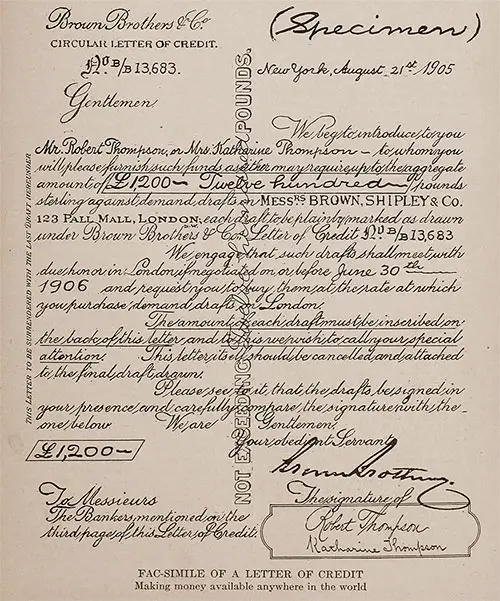
Specimen of a Letter of Credit that Makes Money Available Anywhere in the World. GGA Image ID # 1790349bd5
American Express Cheques
The American Express Company issue express cheques which are available to bankers all over the world. These express cheques are in convenient amounts of $10.00, $20.00, $50.00, etc. They can be purchased at any of the offices of the express company either here or abroad.
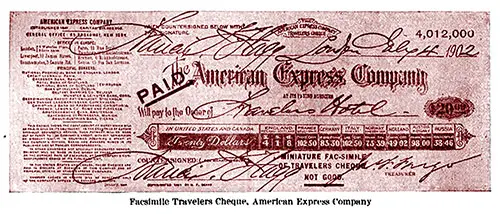
Facsimile Of Express Company Cheque for $20 from 1902. GGA Image ID # 17903a6c42
Circular notes
Circular notes or travelers' checks in $10.00, $20.00, $50.00 and $100.00 denominations are another form of express and steamship company checks issued by reputable tourist agencies. The checks are practically the same, but a letter of identification often accompanies it the same as a letter of credit. All of these methods of carrying funds are considered safe, but great care should be taken not to lose any of them.
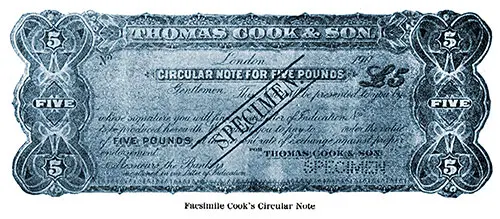
Specimen Circular Note for Five Pounds from Thomas Cook & Son circa 1907. GGA Image ID # 179124fd39
Steamship Company Checks
Nearly all steamship companies issue checks which are available the same as express checks and letters of credit. These have the advantage of being cashed at the offices of the steam ship companies at hours when banks are not open, and they may be cashed in moderate amounts on the steamer for obtaining funds for use during the voyage.
Hotels will usually cash them if the amounts are not too large. Additional amounts can be secured by cable, the money being deposited in New York and the checks issued by the steamship office abroad.
In case of loss, new checks are issued upon satisfactory proof of ownership and the execution of a bond of indemnity with proper security. Checks not used are redeemed at full price. The charge is usually ½ of one per cent., but this may vary.
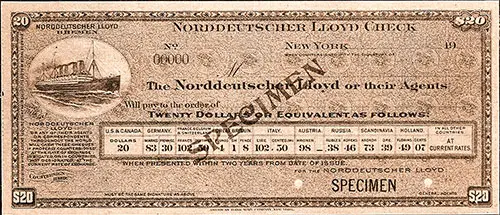
Specimen of a Steamship Company Traveler's Cheque for $20, Issued by the Norddeutscher Lloyd, circa 1910. GGA Image ID # 179152b7ca
Fees Paid by Passengers on Steamships
The question of the fees which are to be given on ocean steamers is a most important one, not entirely from the amount of the largesse involved, but owing to the, possible annoyance which may be caused by a misunderstanding of the unwritten rules of the sea.
Various books dealing with the subject of European travel give the very vague information that ten shillings, or $2.50, is to be given to each of the stewards, namely, the room steward and the table steward. This rate, however, is not fixed by any manner of means.
The writer has prepared the following table after consultation with an ex-purser who has been for many years in the trans-Atlantic trade, and it is believed to be both equitable to the stewards and fairly economical to the passenger.
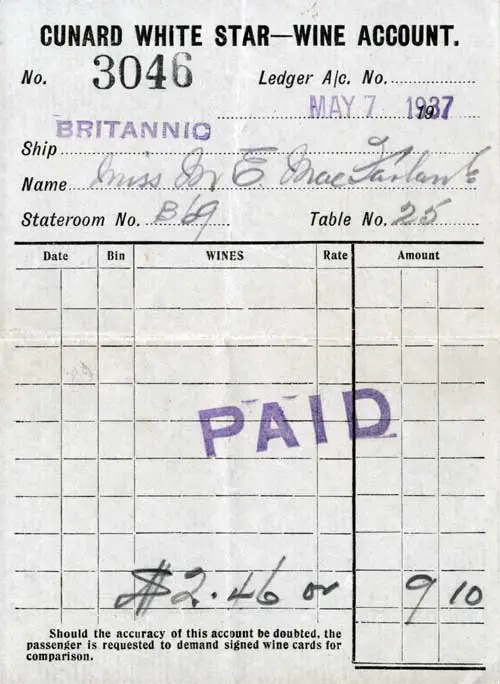
Receipt for Payment of Wine Purchased During Voyage by This Passenger on Account. While This Receipt Dates From 1937, Receipts From 1910 Would Likely Have a Similar Format. GGA Image ID # 1791990187
The fees which are to be given to the table steward may be reckoned at ten shillings, or $2.50 for each person occupying a seat at the table, but where there is a number in a party this amount can be slightly shaded.
Thus, if there are five in the party, $10.00 would be considered to be an ample fee. The following sliding scale of fees for stateroom stewards is based upon the passage money paid per berth occupied :
Cost per berth |
Recommended Tip per Person. |
$80.00 |
$2.00 |
$125.00 |
$2.50 |
$250.00 |
$3.00 |
$350.00 |
$3.50 |
$500.00 |
$5.00 |
No scale of fees can be recommended to those having private suites, as the fee should be based on the services rendered. Where staterooms have a private bath, about $1.00 extra should be added to the compensation of the steward who has charge of the room, per person. This is about what would be given had the baths been taken in the common bathrooms.
The bath steward will expect a fee of a dollar if several baths are taken. A fee of one shilling should be given for a single bath.
The boys who clean the stairs, passageways, etc., are technically called "boots," and receive, on English lines, half a crown (two shillings and six pence), and the equivalent would prove satisfactory on other lines.
There is no difficulty at the end of the voyage in ascertaining who has been the particular person who has had charge of the shoe polishing. Shoes should be left outside of the door and they will be found cleaned in the morning.
The deck steward, provided that he does anything for a passenger, should receive about $1.00, or four shillings. It is not obligatory to fee the deck steward unless he has performed some actual services.
Where ladies are in the party, it is customary to fee the deck steward, as he is apt to perform many services locating steamer chairs, adjusting steamer rugs, etc.
On some lines the smoke room stewards are not allowed to put out a tray for the reception of coins at the end of the voyage. If one has used the smoke room quite a good deal, a fee of fifty cents should be given.
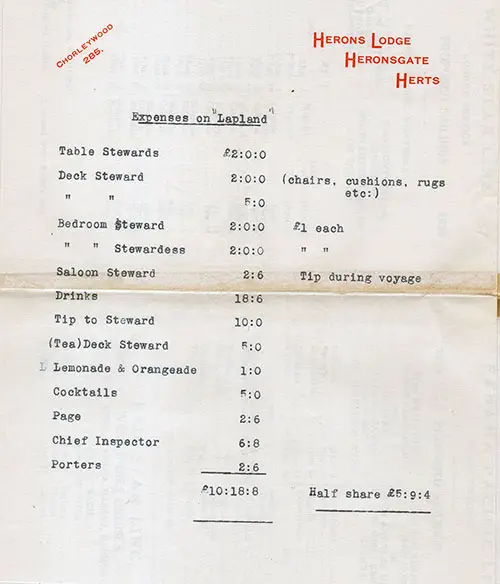
Miss Mulholland, a Passenger on the SS Lapland of the Red Star Line, Provides an Accounting of Onboard Expenses Paid - A Total of £10:18:8. GGA Image ID # 140330dee0
On some lines passengers arrange a subscription for the orchestra or band, and on some of the German lines the offering for "musik" is made when the payments are made to the steward for the wine account.
Passengers should not feel, however, that this fee for "musik" is obligatory. The band is a source of great annoyance to many passengers, and they should not be compelled to pay for something which they did not enjoy. This is practically the list of fees as regards the male members of the party.
Stewardesses who assist ladies should be given fees which may be reckoned at about two-thirds the fees which are given to the room, stewards. Where no services have been rendered, no fees are expected.
There are, however, very rare instances where this occurs. The fees to the room stewards, table stewards, and bath stewards, should not be evaded by the passenger.
Passengers who object on principle to the paying of fees will find the end of their voyage very uncomfortable, and they will undoubtedly end in paying the fees which they have begrudged.
It should be remembered that the stewards only receive a very small compensation from the company, and they nearly all have families depending upon them.
Always figure that if you were not compelled to pay fees, your cost of ocean passage would be increased. The fees in the second cabin are about one-half those paid in the first cabin.
All fees are payable at the time of debarkation. Under no circumstances pay any fees whatsoever until the end of the voyage, as stewards' memories are apt to be somewhat short. A careful perusal of the hints relative to feeing will prevent annoying misunderstandings.
Some persons recommend that the head steward be feed immediately on coming aboard. This seems, however, like an unnecessary expense, as the conditions under which he is hired are entirely different from those of the ordinary steward.
New conditions have introduced new problems into the feeing question: thus the gymnasium steward should be feed if the gymnasium has been used—fifty cents should be sufficient.
Money by Telegraph
All telegraph companies accept orders, both domestic and foreign, to immediately transfer money by telegraph and cable. It is sometimes imperative to obtain large or small sums at the shortest possible moment, certainly within twenty-four hours. Formerly, this branch of the business was in the hands of bankers, but now the cable companies and telegraph companies are able to pay money in places all over the world.
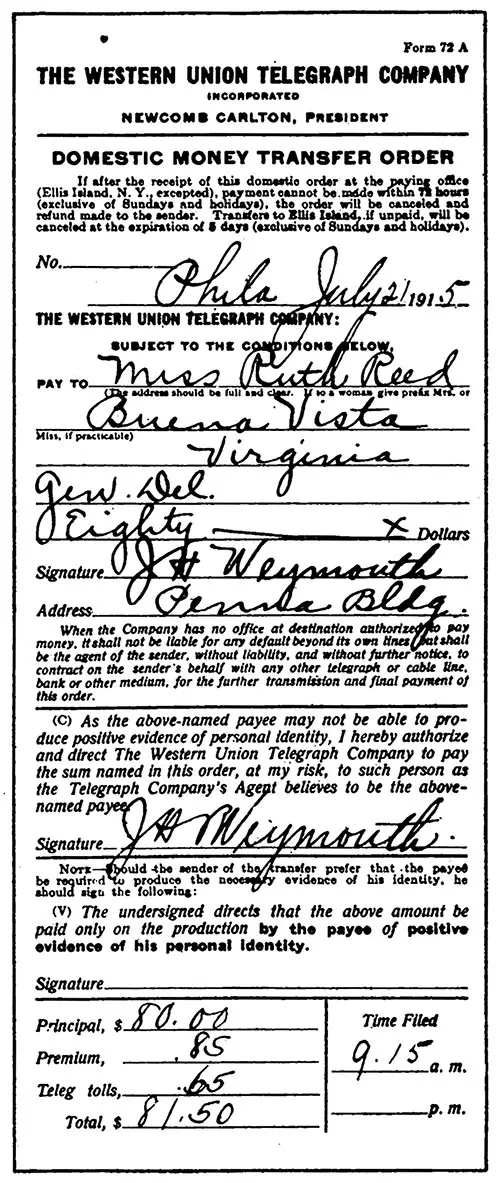
Western Union Telegraph Company Sample Domestic Money Tranfer Order Form, 1915. GGA Image ID # 17919911ca
The organization of telegraph and cable companies is the most complicated one. There are many factors that control rates. In general, it may be stated that money can be sent anywhere in the United States at a premium of one percent., a minimum charge of twenty-five cents, plus the telegraph tolls for a ten-word message.
For money sent abroad, the premium is one percent, with the minimum charge of fifty cents, plus the cable tolls, which will vary with the length of address. The fullest possible information can be obtained at any telegraph office where a special tariff book of some 250 pages may be consulted.
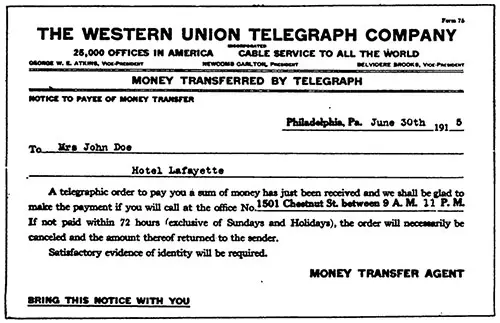
Western Union Telegraph Company Money Transferred by Telegraph Notification Form, 1915. GGA Image ID # 1791bbce95
For some countries, such as those in Central and South America, the expense is much greater than we have noted. The British Postmaster General has entered into an agreement with the Western Union Telegraph Company for an exchange through that company so they will telegraph money- orders between the United Kingdom on the one hand and Canada and the United States on the other after January 1, 1910.
The largest amount for which a single money order may be issued in the United Kingdom will be £40 sterling, but for orders issued in the United States and Canada for payment in the United Kingdom, the largest amount will be £41 Is. 4d., which is the equivalent of $200.
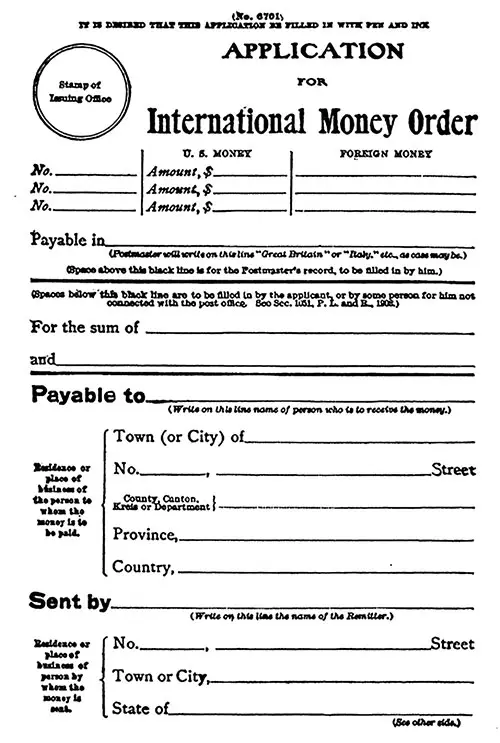
International Money Order Application, 1912. GGA Image ID # 17920672c3
